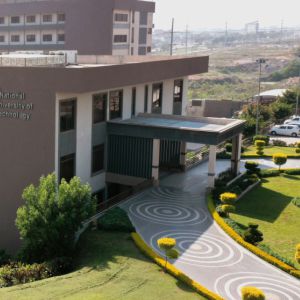NBTPE is a NAVTTC accredited Qualification Awarding Body (QAB) dedicated to empowering the Technical and Vocational Education and Training (TVET) sector across Pakistan. Committed to fostering skills development and professional excellence, NBTPE focuses on affiliating TVET institutes nationwide to uplift technical education, building trainers’ capacity with advanced methodologies, and implementing competency-based assessments aligned with NAVTTC policies. NBTPE awards certifications from Levels 1 to 5 through objective evaluations, Recognition of Prior Learning (RPL), and refines assessment systems to address industry demands and bridge workforce gaps. Additionally, NBTPE collaborates with TVET institutes to enhance learning standards and promote industry-relevant education.
To develop a credible and reliable affiliation, curricula designing and implementation, examination and assessment systems to produce competent professionals and skilled workforce in accordance with internationally recognized TVET levels and standards to best serve the Society and Industry.

| Type | Course Affiliation | Renewal | Remarks |
| DAE | Rs. 50000/- | Rs. 25000/- | Up to three Technology |
| Rs. 20000/- | Rs. 10000/- | Each subsequent Technology |
|
| Vocational (CBT&A / Short Course) |
Rs. 25000/- | Rs. 10000/- | Up to three Technology |
| Rs. 10000/- | Rs. 5000/- | Each subsequent Technology / course | |
| Zero / interim/ Final visit | Rs. 25000/- per visit | ||
Accreditation ensures that technical and professional programs meet established quality standards. The NBTPE office evaluates educational institutions to certify their programs. This involves assessing faculty qualifications, infrastructure, and curriculum relevance. Accredited programs gain credibility and recognition nationwide and internationally. The process builds trust among employers, students, and other stakeholders. It also encourages continuous improvement in educational standards. Institutions often revise their programs to comply with accreditation criteria. Accreditation serves as a benchmark for quality in technical education. It helps students select reputable institutions for their studies. Ultimately, it aligns education with industry and global standards.
NBTPE plays a key role in designing and updating curricula for technical and vocational education. The process involves collaboration with industry experts and educators. Updated curricula ensure that courses are relevant to current job market demands. Emphasis is placed on practical skills and theoretical knowledge. The bureau regularly reviews curricula to include advancements in technology and practices. Curriculum development aligns education with national economic goals. It helps institutions prepare students for emerging fields and global challenges. Clear learning outcomes are defined for each program. Institutions receive guidelines on implementing updated curricula. This service bridges the gap between education and industry needs.
NBTPE organizes training programs to enhance skills in various technical and vocational fields. These programs target students, professionals, and educators. They cover a wide range of topics, from basic skills to advanced technical expertise. Training sessions are conducted by industry experts and certified trainers. Hands-on learning is emphasized through workshops and practical demonstrations. The bureau aims to increase employability and productivity through these programs. Participants gain certifications that add value to their professional profiles. Training programs can also focus on soft skills, such as communication and teamwork. They support lifelong learning and adaptability to technological advancements.
Certification is a vital service provided by NBTPE, recognizing individuals' skills and qualifications. It ensures that individuals have met specific standards in their field of study or training. Certificates issued by the bureau are nationally recognized and often valued internationally. They enhance employability and career progression for individuals. Certification also validates the quality of training programs and institutions. Employers trust certified candidates for their verified expertise. The bureau manages assessments to ensure fair and accurate evaluations before certification. Digital certification options may also be offered for easy verification. These services contribute to a standardized system of technical education.
NBTPE conducts workshops and training sessions to develop the skills of educators. This ensures instructors are up-to-date with modern teaching methods and technical advancements. Capacity building focuses on pedagogical skills, technical expertise, and curriculum delivery. Educators learn how to integrate technology and practical demonstrations into their teaching. Special programs are organized for leadership development in education. The bureau also promotes networking and knowledge-sharing among educators. Instructors are equipped to provide quality education that meets industry standards. Continuous professional development programs are a key feature. This service raises the overall quality of technical education in the country.
NBTPE manages exams and assessments for technical and professional programs. The bureau designs standardized testing systems to ensure fairness and transparency. Assessment criteria focus on both theoretical knowledge and practical skills. Exams are conducted under strict guidelines to maintain credibility. The bureau uses modern tools for grading and evaluation, ensuring accuracy. Results are released in a timely manner, reflecting students' true performance. Assessments are aligned with industry requirements to gauge job readiness. Special measures are taken to prevent cheating or malpractice. Feedback from assessments is used to improve teaching and curriculum. This service ensures that students meet the required competency standards.
NBTPE provides career counseling services to help students choose suitable career paths. Expert counselors guide students based on their skills, interests, and market trends. The bureau organizes job fairs and placement drives in collaboration with industries. Students are informed about internships, apprenticeships, and job opportunities. Counseling sessions also include resume writing and interview preparation. The service aims to reduce the skill gap in the job market. Partnerships with employers ensure a steady pipeline of trained professionals. Alumni networks are leveraged to create mentoring opportunities. NBTPE ensures students are job-ready by the time they complete their programs.
The bureau promotes research and development in the field of technical education. It encourages institutions to innovate and adopt new teaching methods. Grants and support are provided for research projects that address industry challenges. Collaboration with international organizations ensures access to global advancements. Research findings are used to update curricula and training programs. The bureau also studies labor market trends to predict future skill demands. Institutions are encouraged to share research outcomes for mutual benefit. Research fosters a culture of innovation among students and educators. This service enhances the overall quality and relevance of technical education.
NBTPE partners with industries to provide practical exposure and hands-on training for students. Internships and on-the-job training programs are organized through these collaborations. Industry experts are invited to deliver guest lectures and workshops. The bureau collects feedback from employers to improve educational standards. Partnerships help students understand real-world applications of their learning. Industries benefit by accessing a pool of trained and job-ready individuals. Collaborative programs often result in direct employment opportunities for students. The bureau works to bridge the gap between academic institutions and the corporate sector. Industry input also shapes curriculum updates to meet market demands.
NBTPE monitors the performance of technical institutions and programs regularly. Evaluation criteria include student outcomes, infrastructure, and teaching quality. On-site visits and audits ensure compliance with established standards. Institutions receive constructive feedback to improve their services. The bureau also tracks the employability of graduates as a key performance indicator. Monitoring ensures that resources are utilized effectively and goals are met. Data collected during evaluations help in policy-making and planning. Institutions with exemplary performance are recognized and rewarded. Regular monitoring builds trust among stakeholders and ensures accountability. This service maintains the overall quality of technical education in the country.

Director NBTPE

AD Capacity Building

AD Assessment

AD Curriculum

JO. Registration